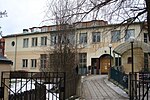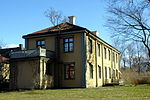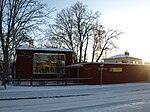The Svedberg Laboratory

The Svedberg Laboratory (TSL) is a university facility, based in Uppsala, Sweden. The activities at TSL are based around the particle accelerator Gustaf Werner cyclotron. The main activity is proton therapy for the treatment of cancer, based on an agreement between the Oncology clinic at Uppsala University Hospital and Uppsala University. Beamtime not used for proton therapy is devoted to commercial neutron and proton irradiation projects, mainly for Radiation testing. There is also some time for basic (academic) research and in this case the experiments should be associated to Uppsala University or to EC projects. TSL is supported by the European Community and belong to the EC projects ERINDA, SkyFlash and CHANDA.
Excerpt from the Wikipedia article The Svedberg Laboratory (License: CC BY-SA 3.0, Authors, Images).The Svedberg Laboratory
Villavägen, Uppsala Kåbo
Geographical coordinates (GPS) Address Nearby Places Show on map
Geographical coordinates (GPS)
| Latitude | Longitude |
|---|---|
| N 59.8537 ° | E 17.6254 ° |
Address
Campus Engelska parken (Humanistiskt centrum)
Villavägen
752 36 Uppsala, Kåbo
Sweden
Open on Google Maps










